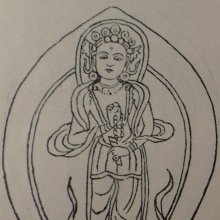Nityanatha, Nityanātha: 6 definitions
Introduction:
Nityanatha means something in Buddhism, Pali, Hinduism, Sanskrit. If you want to know the exact meaning, history, etymology or English translation of this term then check out the descriptions on this page. Add your comment or reference to a book if you want to contribute to this summary article.
Images (photo gallery)
In Hinduism
Ayurveda (science of life)
Rasashastra (Alchemy and Herbo-Mineral preparations)
Source: History of Science in South Asia: Making Gems in Indian Alchemical LiteratureNityanātha (नित्यनाथ) is the author of the Rasaratnākara (lit. “jewel mine of mercury”): a 13th century alchemical work in Sanskrit.—The Rasaratnākara describes the practice of producing gems in the context of the Indian alchemical tradition (rasaśāstra, rasavāda or rasavidyā) which has only few references to it found in its literature.

Āyurveda (आयुर्वेद, ayurveda) is a branch of Indian science dealing with medicine, herbalism, taxology, anatomy, surgery, alchemy and related topics. Traditional practice of Āyurveda in ancient India dates back to at least the first millenium BC. Literature is commonly written in Sanskrit using various poetic metres.
In Buddhism
Tibetan Buddhism (Vajrayana or tantric Buddhism)
Source: archive.org: The Indian Buddhist IconographyNityanātha (नित्यनाथ) or Nityanāthalokeśvara refers to number 103 of the 108 forms of Avalokiteśvara found in the Machhandar Vahal (Kathmanu, Nepal). [Machhandar or Machandar is another name for for Matsyendra.].
Accordingly,—
“Nityanātha is identical with [Piṇḍapātra Lokeśvara], with the difference that here the god holds the rosary in his right hand over the book held in his left.—Piṇḍapātra Lokeśvara is one-faced and two-armed and stands on a lotus. He holds the Piṇḍapātra (the bowl) in his two hands near the navel”.
The names of the 108 deities [viz., Nityanātha] possbily originate from a Tantra included in the Kagyur which is named “the 108 names of Avalokiteshvara”, however it is not yet certain that this is the source for the Nepali descriptions. Tibetan Buddhism includes schools such as Nyingma, Kadampa, Kagyu and Gelug. Their primary canon of literature is divided in two broad categories: The Kangyur, which consists of Buddha’s words, and the Tengyur, which includes commentaries from various sources. Esotericism and tantra techniques (vajrayāna) are collected indepently.
Languages of India and abroad
Sanskrit dictionary
Source: Cologne Digital Sanskrit Dictionaries: Aufrecht Catalogus CatalogorumNityanātha (नित्यनाथ) as mentioned in Aufrecht’s Catalogus Catalogorum:—or nemanāthasiddha Compare Ādinātha: Indrajāla [tantric] K. 38. Oudh. Ix, 28. Kāmaratna. Tantrakośa. Oudh. Viii, 32. Bandhyāvalī med. B. 4, 238. Mantrasāra. L. 614. Rasaratnākara, both tāntric and medical. Siddhakhaṇḍa. Oudh. Vii, 6. Siddhasiddhāntapaddhati. W. p. 197. Hall. p. 15.
Nityanātha has the following synonyms: Nityanāthasiddha.
Source: Cologne Digital Sanskrit Dictionaries: Monier-Williams Sanskrit-English DictionaryNityanātha (नित्यनाथ):—[=nitya-nātha] [from nitya] m. Name of an author (also -siddha), [Catalogue(s)]
[Sanskrit to German]
Sanskrit, also spelled संस्कृतम् (saṃskṛtam), is an ancient language of India commonly seen as the grandmother of the Indo-European language family (even English!). Closely allied with Prakrit and Pali, Sanskrit is more exhaustive in both grammar and terms and has the most extensive collection of literature in the world, greatly surpassing its sister-languages Greek and Latin.
See also (Relevant definitions)
Partial matches: Natha, Nitya.
Starts with: Nityanatha siddha, Nityanathalokeshvara, Nityanathasiddha.
Full-text (+96): Nityapada, Nityanatha siddha, Mantrasaroddhara, Rasaratnamala, Rasaratnakara, Ramasena, Nemanatha siddha, Bandhyavali, Mantrasara, Nemanatha, Siddhikhanda, Nityananda, Indrajala, Rasasaramrita, Tantrakosha, Siddhakhanda, Rasaratnasamuccaya, Sthula, Tvac, Matsyatvac.
Relevant text
Search found 5 books and stories containing Nityanatha, Nityanātha, Nitya-natha, Nitya-nātha; (plurals include: Nityanathas, Nityanāthas, nathas, nāthas). You can also click to the full overview containing English textual excerpts. Below are direct links for the most relevant articles:
Rasa Jala Nidhi, vol 5: Treatment of various afflictions (by Bhudeb Mookerjee)
Part 20 - Chemists of the Metallic School: Nitya-natha < [A Brief History of Indian Chemistry and Medicine]
Part 14 - Chemists of the Metallic School: Shambhu < [A Brief History of Indian Chemistry and Medicine]
Part 17 - Chemists of the Metallic School: Nagarjuna < [A Brief History of Indian Chemistry and Medicine]
The Indian Buddhist Iconography (by Benoytosh Bhattachacharyya)
Rasa Jala Nidhi, vol 3: Metals, Gems and other substances (by Bhudeb Mookerjee)
Part 10 - Names of well-known chemists < [Chapter XXXIV - Paribhasa (definitions)]
Part 1 - Characteristics of Iron (lauha) < [Chapter IV - Metals (4): Lauha (iron)]
A History of Indian Philosophy Volume 2 (by Surendranath Dasgupta)
Part 18 - Āyurveda Literature < [Chapter XIII - Speculations in the Medical Schools]
